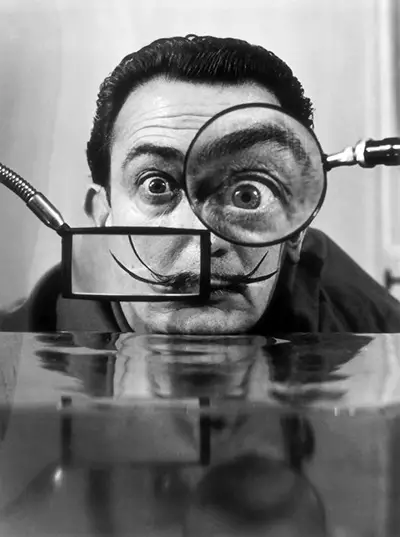Famous Quotes by Salvador Dali
Anthropomorphic themes appear and reappear in my jewels. I see the human form in trees, leaves, animals; I see animal and vegetal characteristics in humans. My art — in painting, diamonds, rubies, pearls, emeralds, gold, chrysolite — demonstrate how metamorphosis comes about; human beings create and change. When they sleep, they change totally — into flowers, plants, trees. The new metamorphosis takes place in Heaven. The body becomes once again whole and reaches perfection.
At the age of six I wanted to be a cook. At seven I wanted to be Napoleon. And my ambition has been growing steadily ever since.
Democratic societies are unfit for the publication of such thunderous revelations as I am in the habit of making.
Don't bother about being modern. Unfortunately it is the one thing that, whatever you do, you cannot avoid.
Drawing is the honesty of the art. There is no possibility of cheating. It is either good or bad.
Each morning when I awake, I experience again a supreme pleasure - that of being Salvador Dali.
Every morning when I wake up, I experience an exquisite joy —the joy of being Salvador Dalí— and I ask myself in rapture: What wonderful things is this Salvador Dalí going to accomplish today?
Give me two hours a day of activity, and I'll take the other twenty-two in dreams.
Have no fear of perfection - you'll never reach it.
Having become one of the most famous and influential artists of the 20th century, the outspoken Dali has become much studied and researched. Some of his quotes have become particularly well known, whilst others have been used to understand more about his complex surrealist paintings.
I don't do drugs. I am drugs.
I don't paint a portrait to look like the subject, rather does the person grow to look like his portrait.
I have Dalinian thought: the one thing the world will never have enough of is the outrageous.
In order to acquire a growing and lasting respect in society, it is a good thing, if you possess great talent, to give, early in your youth, a very hard kick to the right shin of the society that you love. After that, be a snob.
Instead of stubbornly attempting to use surrealism for purposes of subversion, it is necessary to try to make of surrealism something as solid, complete and classic as the works of museums.
Intelligence without ambition is a bird without wings.
It is good taste, and good taste alone, that possesses the power to sterilize and is always the first handicap to any creative functioning.
It is not necessary for the public to know whether I am joking or whether I am serious, just as it is not necessary for me to know it myself.
Mistakes are almost always of a sacred nature. Never try to correct them. On the contrary: rationalize them, understand them thoroughly. After that, it will be possible for you to sublimate them.
One day it will have to be officially admitted that what we have christened reality is an even greater illusion than the world of dreams.
Progressive art can assist people to learn not only about the objective forces at work in the society in which they live, but also about the intensely social character of their interior lives. Ultimately, it can propel people toward social emancipation.
Since I don't smoke, I decided to grow a mustache - it is better for the health. However, I always carried a jewel-studded cigarette case in which, instead of tobacco, were carefully placed several mustaches, Adolphe Menjou style. I offered them politely to my friends: "Mustache? Mustache? Mustache?" Nobody dared to touch them. This was my test regarding the sacred aspect of mustaches.
Take me, I am the drug; take me, I am hallucinogenic.
The difference between false memories and true ones is the same as for jewels: it is always the false ones that look the most real, the most brilliant.
The only difference between me and a madman is that I'm not mad.
You have to systematically create confusion, it sets creativity free. Everything that is contradictory creates life.
Quotes about Salvador Dali by Fellow Artists and Art Historians
As a youth Dalí identified as Communist, anti-monarchist and anti-clerical and in 1924 he was briefly imprisoned by the Primo de Rivera dictatorship as a person "intensely liable to cause public disorder." When Dalí officially joined the Surrealist group in 1929 his political activism initially intensified. In 1931 he became involved in the Workers' and Peasants' Front, delivering lectures at meetings and contributing to their party journal. However, as political divisions within the Surrealist group grew, Dalí soon developed a more apolitical stance, refusing to publicly denounce fascism. In 1934 Andre Breton accused him of being sympathetic to Hitler, and Dalí narrowly avoided being expelled from the group. After the outbreak of the Spanish Civil War in 1936 Dalí avoided taking a public stand for or against the Republic. However, immediately after Franco's victory in 1939 Dalí praised Catholicism and the Falange and was expelled from the Surrealist group.
Wikipedia, regarding his political ideals
Freudian theory underpins Dalí's attempts at forging a visual language capable of rendering his dreams and hallucinations. These account for some of the iconic and now ubiquitous images through which Dalí achieved tremendous fame during his lifetime and beyond.
TheArtStory.org
Obsessive themes of eroticism, death, and decay permeate Dalí's work, reflecting his familiarity with and synthesis of the psychoanalytical theories of his time. Drawing on blatantly autobiographical material and childhood memories, Dalí's work is rife with often ready-interpreted symbolism, ranging from fetishes and animal imagery to religious symbols.
TheArtStory.org
Salvador Dalí made paintings, sculptures and films about the dreams he had. He painted melting clocks and floating eyes, clouds that look like faces and rocks that look like bodies. Sounds weird right? Think about what your paintings would look like if you painted your dreams? I bet they would be pretty weird too! Dalí was involved with surrealism. This was an art movement where painters made dream-like scenes and showed situations that would be bizarre or impossible in real life. Look at this painting above – does the lake look like a fish to you?
Tate Kids
The Spanish painter Salvador Dali remains one of the most controversial and paradoxical artists of the twentieth century. Over last few decades, Salvador Dali has gradually come to be seen, alongside the likes of Picasso and Matisse, as a prodigious figure whose life and work occupies a central and unique position in the history of modern art. Dali has also come to be regarded not only as its most well-known exponent but also, to many people, as an individual artist synonymous with Surrealism itself.
DaliPaintings.com

